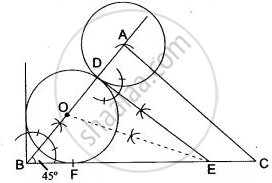Advertisements
Advertisements
Question
Ruler and compasses only may be used in this question. All constructions lines and arcs must be clearly shown, and the be sufficient length and clarity to permit assessment:
(i) Construct a triangle ABC, in which AB = 9 cm, BC = 10 cm and angle ABC = 45°.
(ii) Draw a circle, with center A and radius 2.5 cm. Let it meet AB at D.
(iii) Construct a circle to touch the circle with center A externally at D and also to touch the line BC.
Solution

Steps of construction:
1) Take BC = 10 cm
2) Make ∠ ABC = 45° and with centre B, cut the arc = 9 cm.
3) Join AC, So Δ ABC is the required triangle.
4) With A as centre and radius = 2.5 cm, draw a circle. It will pass through D.
5) Draw DE ⊥ AB, which cuts BC at E.
6) Draw the angle bisector of ∠ BED which cut BD at O.
7) Taking Radius = OD to draw a circle which touches the first circle at D and also touches the line BC at F.
8) This is the required circle. The radius OD = 2.7 cm.
APPEARS IN
RELATED QUESTIONS
Using ruler and compass only, construct a ΔABC such that BC = 5 cm and AB = 6.5
cm and ∠ABC = 120°
1) Construct a circum-circle of ΔABC
2) Construct a cyclic quadrilateral ABCD, such that D is equidistant from AB and BC.
Using ruler and compasses only,
- Construct a triangle ABC with the following data :
Base AB = 6 cm, BC = 6.2 cm and ∠CAB = 60°. - In the same diagram, draw a circle which passes through the points A, B and C and mark its center O.
- Draw a perpendicular from O to AB which meets AB in D.
- Prove that : AD = BD.
Perpendicular bisectors of the sides AB and AC of a triangle ABC meet at O.
- What do you call the point O?
- What is the relation between the distances OA, OB and OC?
- Does the perpendicular bisector of BC pass through O?
Constuct a triangle ABC with AB = 5.5 cm, AC = 6 cm and ∠BAC = 105°. Hence:
- Construct the locus of point equdistant from BA and BC.
- Construct the locus of points equidistant from B and C.
- Mark the point which satisfies the above two loci as P. Measure and write the length of PC.
Using ruler and compasses only, construct and equilateral triangle with side 4.5 cm. Draw a circumcircle of this triangle and measure its radius.
Draw a circle of radius 2. 5 cm and circumscribe a square about it.
Perpendicular bisectors of the sides AB and AC of a triangle ABC meet at O.
What is the relation between the distances OA, OB and OC?
Construct an isosceles triangle ABC such that AB = 6 cm, BC = AC = 4 cm. Bisect ∠C internally and mark a point P on this bisector such that CP = 5 cm. Find the points Q and R which are 5 cm from P and also 5 cm from the line AB.
Construct a Δ ABC with BC = 6.5 cm, AB = 5.5 cm, AC = 5 cm. Construct the incircle of the triangle. Measure and record the radius of the incircle.
Use ruler and compasses only for this question:
(i) Construct A ABC, where AB = 3.5 cm, BC = 6 cm and ∠ ABC = 60°.
(ii) Construct the locus of points inside the triangle which are equidistant from BA and BC.
(iii) Construct the locus of points inside the triangle which are equidistant from B and C.
(iv) Mark the point P which is equidistant from AB, BC, and also equidistant from B and C. Measure and record the length of PB.
